Key Is Diversification
of Business
Korea Post President Hwang unveils his ambitious plan to reform KP
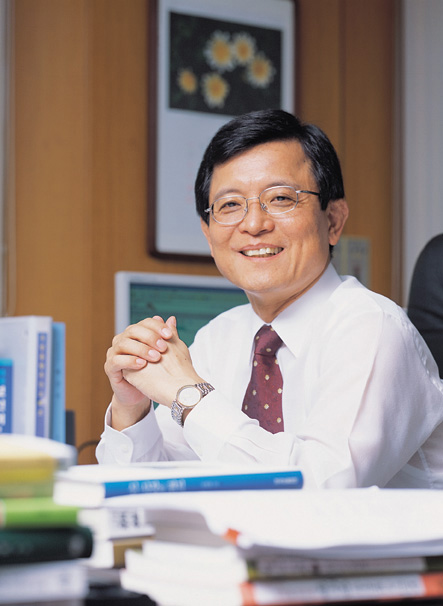 Korea Post President Hwang Joong-yon talks about the need for Korea Post to be elevated to the Korea Post Authority and continue to be a government-run organization to do its job fully. He wants KP to become a fully independent operation financially by tapping into new business areas, in addition to the postal delivery and financial service. He said the home delivery service and EMS are some of the new business areas for KP and the elevation of KP, which will take place at the end of this year or early next year would give KP the capacity to be an independent and self-sustaining operation. Following are excerpts from his exclusive recent written interview with NewsWorld:
Korea Post President Hwang Joong-yon talks about the need for Korea Post to be elevated to the Korea Post Authority and continue to be a government-run organization to do its job fully. He wants KP to become a fully independent operation financially by tapping into new business areas, in addition to the postal delivery and financial service. He said the home delivery service and EMS are some of the new business areas for KP and the elevation of KP, which will take place at the end of this year or early next year would give KP the capacity to be an independent and self-sustaining operation. Following are excerpts from his exclusive recent written interview with NewsWorld:
Question: Can you explain to our readers, President Hwang, the history of Korea Post, especially, the changes in the country's postal services since the time it was first launched?
Answer: Our country's postal service goes way back to the Three Kingdoms'Period, according to the ancient history journal Samguksagi.
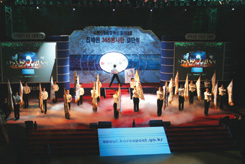 The journal said the service was first launched in 487 in the Silla Dynasty when postal stations were set up then in the kingdom.
The journal said the service was first launched in 487 in the Silla Dynasty when postal stations were set up then in the kingdom.
During the waning years of the Jeoson Dynasty in the beginning of the 20th century, cabinet minister Hong Young-shik had a chance to take a trip to the United States and Japan and found out that the postal service in those countries played a key role. He recommended the establishment of the service in the country to King Kojong. On April 22, 1884, the king announced the opening of the postal office and on Nov. 18, the post office first issued the country's first stamps, marking the start of the country's postal service.
Before the operation of the service, the rich and titled class exchanged letters or messages through their personal messengers, which was impossible for the general public. The introduction of the postal service marked the beginning of the modern- day administrative system in Korea, much like the information technology today in impact on society.
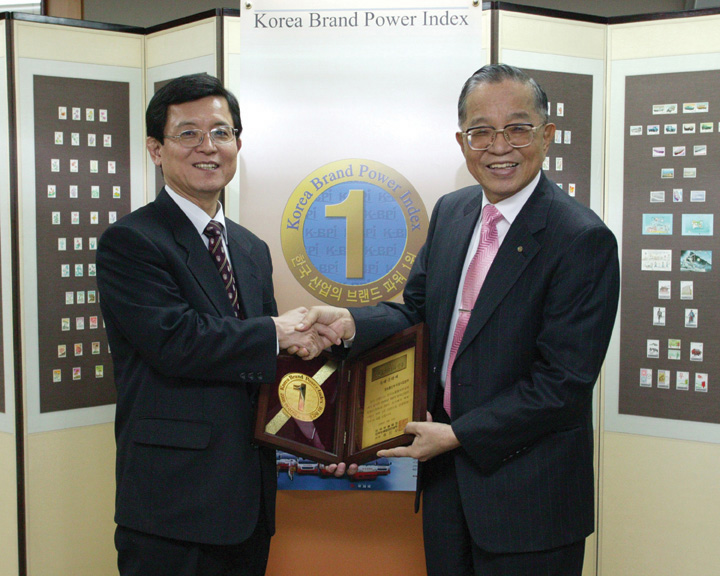 In 1885, the telephone service was first introduced and electricity in 1887. In 1889, the railroad became operational. Korea's postal service has 122 year long history. Korea Post was born in July 1, 2000.
In 1885, the telephone service was first introduced and electricity in 1887. In 1889, the railroad became operational. Korea's postal service has 122 year long history. Korea Post was born in July 1, 2000.
Q: Can you explain briefly the operation of Korea Post?
A: Korea Post is the government-funded service organization dedicated to upgrading the quality of life for the people through its postal and financial services. It funds its own operations. Its operation reaches every where in the country, farm and fishing villages and mountainous regions to render public services. KP is engaged in delivering mail, taking deposits, insurance, postal money orders, home delivery, EMS, flower delivery, and electronic mail. KP has been switching increasingly to logistics business operation centered around postal home delivery service, and EMS. It also has been rendering efforts to take on such businesses as e-business, mobile banking, and others to diversify its IT-related operations.
 KP has three directly-controlled units and 8 local postal offices with 2,800 postal offices across the country and 854 postal handling units with 42,000 employees.
KP has three directly-controlled units and 8 local postal offices with 2,800 postal offices across the country and 854 postal handling units with 42,000 employees.
Q: Can you introduce to us uPost 339 Strategy under the management vision of "Love of the People, Postal Service,"which KP has been pushing?
A: Our management vision is to provide postal and financial services loved by the public on a continuous basis after securing a sound-profit structure and independent management base.
KP has been pushing the uPost 339 Strategy meaning 3 reform strategies, 3 large implementation bases, and 9 policy achievement tasks to realize KP's management vision, "Love of the People, Postal Service."Three reform strategies include: reform of customer service. The level of customer service will be standardized depending on different circumstances and strengthen education on customer service by roles and actions.
Reform of business model: Add home delivery and EMS and other strategic commodities to the traditional mail and parcel delivery services with the infusion of the information technology.
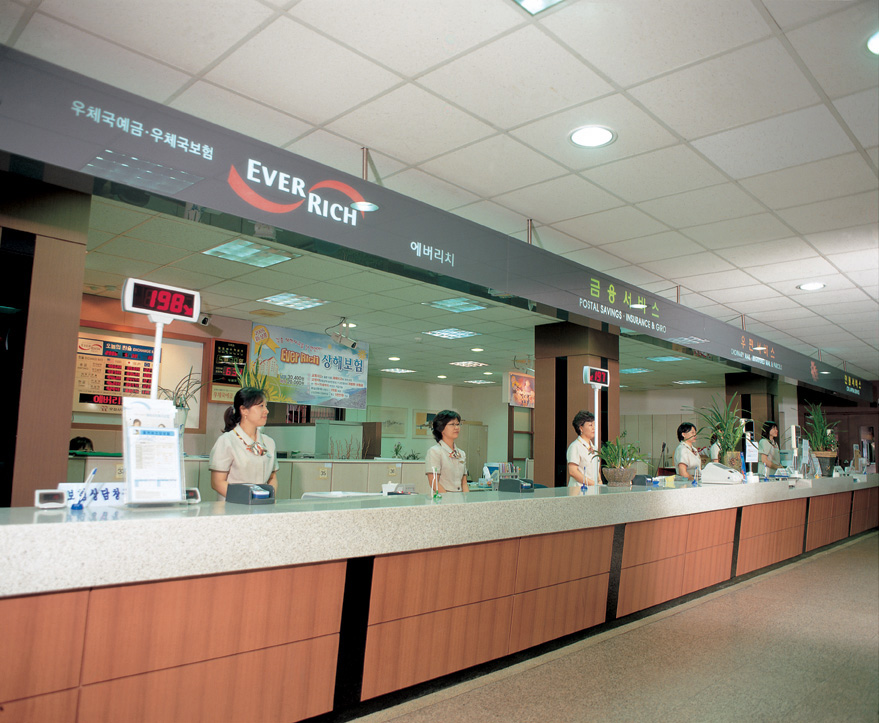 Reform of process: Eliminate non-effective services through the promotion of the Six Sigma Program.
Reform of process: Eliminate non-effective services through the promotion of the Six Sigma Program.
Second. The construction of three largest support bases for the reform strategies, which comprise upgrading welfare of its employees through: Expansion of welfare for employees. Extend a 40-hour work week system, the establishment of child care facilities, and the readjustment of office work hours. Cooperation of labor and management: Sharing of information and regularize labor-management meetings. Performance remuneration: Evaluation of individual performance and the fostering of a self-development lesson environment.
The number 9 represents the tasks for KP such as postal service, finance, and management in details, with specifics for their targets. Postal service should upgrade its service quality, building logistics base for uPost and foster strategic businesses. In the area of finance, build u-banking centered on customers, expand the public nature of its operation, expand a stable growth base,
 build a dynamic organizational system in the area of the management sector, strengthen the competitiveness of human resources and upgrade management control system.
build a dynamic organizational system in the area of the management sector, strengthen the competitiveness of human resources and upgrade management control system.
Q: Could you briefly tell us about the management results of KP's third period?
A: KP tried hard to upgrade postal and financial services to make customers feel satisfied under the uPost339 Strategy. KP has been promoting the five large campaigns for home delivery service to upgrade home delivery service. Real names of deliverers have been in use for clearer and more transparent delivery system. The reimbursement fees for unsatisfactory delivery services have been raised from 400,000 won to 500,000 won to increase the public trust in the service.
KP's financial service has been playing a supplementary role to the banking industry and focused on uBanking build-up through upgraded financial service, the development of new financial products and the electronic banking including the mobile banking by expanding the 365 corner continuously.
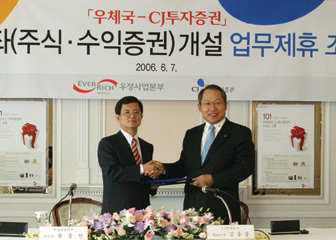 In 2005, KP made a profit amounting to 67.4 billion won. KP built its operations around the registered mail and EMS and other strategic service sectors, switching from general mail delivery service. It also successfully operated IT-shopping, asset management, and errand services, and other customer services in an effort to produce "blue ocean"businesses.
In 2005, KP made a profit amounting to 67.4 billion won. KP built its operations around the registered mail and EMS and other strategic service sectors, switching from general mail delivery service. It also successfully operated IT-shopping, asset management, and errand services, and other customer services in an effort to produce "blue ocean"businesses.
KP also has been faithfully pursuing its public function as a state-owned organization in the areas of postal service and finance. It has successfully reduced costs and rearranged office processes to make the operation end in the black, despite the low delivery charges. It also provided financial services to small farm and fishing villages through expanded mobile banking, TV banking, and 365 automatic account increasing its numbers from 622 to 700.
KP also has expanded the number of farm and fishery products that can be bought through postal shopping in an effort to spur local economy and for more balanced regional development.
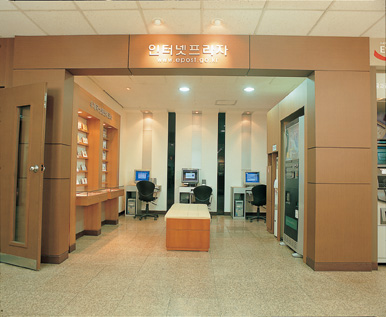 KP plans to expand its investment in regional social overhead capital and indirect support to small and medium businesses.
KP plans to expand its investment in regional social overhead capital and indirect support to small and medium businesses.
KP has also been working hard to upgrade its international image and foster global enterprises. It has been promoting jointly the Kahala strategic businesses with 6 postal authorities in the Asia-Pacific region. It built an e-catalog system to support exports of IT technology. It has established an export council and concluded MOUs with foreign postal authorities to support the modernization of those countries'postal services and support the exports of postal IT business firms.
KP won the first place in the evaluation of customer satisfaction through various reform in its public service, while setting up call centers and the voice of customers collection system.
KP won the first place in the public administration public service sector in the Korean Industry Customer Satisfaction Survey for seven years in a row(1999-2005). It also won the first place in the national customer satisfaction of the general administration sector for 4 years continuously from 2002 to 2005.
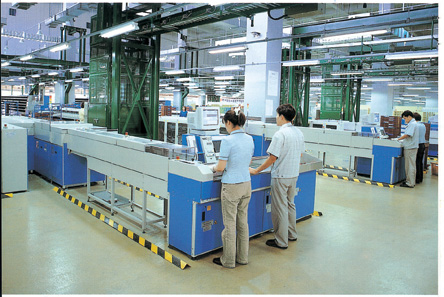 KP also won the Gold Prize in the evaluation of EMS conducted by the International Postal Union in 2005.
KP also won the Gold Prize in the evaluation of EMS conducted by the International Postal Union in 2005.
KP will continue to upgrade its service to customers under the u-Post339 strategy and reform other business models such as home delivery and EMS, while building a logistics base for u-Post and customer centered u-Banking to become a fully independent KP operation base.
Q: We heard that you set up the Export Council to support the export of postal service products abroad. What was the motivation, the businesses being pushed and plans to provide supports?
A: We attended the World Post Expo held in Paris in October last year and learned that foreign postal operators were interested in our IT and postal equipment at the global event. We also saw a number of booths set up by small and medium companies from Korea to exhibit their PDAs they supply to KP.
Following our return from Paris, we searched for ways to support foreign ventures of our vendors.
 We set up the IT Industrial Firms Export Support Council made up of professionals from industry, academia, and state-run organizations and held its first meeting on Dec. 1 last year.
We set up the IT Industrial Firms Export Support Council made up of professionals from industry, academia, and state-run organizations and held its first meeting on Dec. 1 last year.
The council holds regular meetings to discuss Postal IT Industry's trends overseas and means to support exports of postal IT products. The council dispatched the Postal IT Export Mission made of its members to Vietnam and Malaysia to promote postal IT business cooperation and exports of postal IT exports based on MOUs the mission signed.
Representatives of postal authorities in 27 countries attended the Korea Post Forum 2006 and held a number of sideline events including a postal academic meeting, and they also viewed the Korea Postal Public Relations Hall, and the Exhibition of New Postal IT Products designed to spur exports of postal IT products, all in line with KP's strategy to support the exports of postal IT products from Korea.
KP opened e-Catalog on the Internet to display information on postal IT products in three dimensional moving images in March designed to develop equipment related to postal IT business and management solution supply including their public relations and export negotiations.
KP plans to build a data base for postal information in various foreign countries, which can be downloaded on real time and dispatch personnel to promote exports of postal IT products from Korea.
Q: You emphasized that Korea Post should be renamed as the Korea Post Authority. Is it possible to change the name by the end of this year and what would the difference be if the KP is elevated?
A: Postal service is a public service designed to take care of residents on islands and in the under-developed areas in terms of communication and financial facilities and therefore should remain as a government business form. Only thing is that KP should be able to take care of itself financially providing general services to public with its own income without government support and it needs an overall reform to do that.
KP needs to be elevated to the Korea Post Authority to be able to respond to management environment changes rapidly, autonomous decision-making, and for the establishment of a independent, and responsible management system in such matters as personnel, budget, and organization.
It is possible to elevate KP at the end of this year or early next year as the draft on revision of government organization law is up for parliamentary approval in February by the Ministries of Information and Communication and the Ministry of Administration and Home Affairs.
KP also plans to have separate accounting for its information communication sector, postal service, and financial business sectors based on the related laws up for parliamentary approval expected before January next year, when the accounting system is to be changed. nw
Korea Post President Hwang Joong-yon
(Clock wise) A scene from the performance by Korea Post social service troupe. Korea Post President Hwang receives the Korea Brand Power Index Award. Shelves for awards won by Korea Post. Korea Post financial service counter for "Ever Rich"deposit accounts. A call center at Korea Post. Korea Post President Hwang shakes hands with President Kim Hong-chang of CJ Investment & Securities Co. after signing an agreement allowing Korea Post to handle the sale of stocks for the securities firm.
(from above photo) The Internet Plaza at Korea Post. A scene of a mail sorting service at Korea Post. A monitoring room to watch any malfunctioning of high-tech equipment at Korea Post.
3Fl, 292-47, Shindang 6-dong, Chung-gu, Seoul, Korea 100-456
Tel : 82-2-2235-6114 / Fax : 82-2-2235-0799